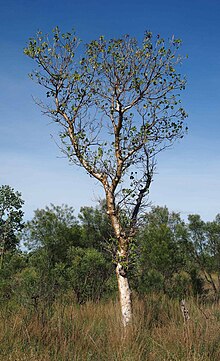Gyrocarpus americanus
| Gyrocarpus americanus | |
|---|---|

| |
| Scientific classification | |
| Kingdom: | Plantae |
| Clade: | Tracheophytes |
| Clade: | Angiosperms |
| Clade: | Magnoliids |
| Order: | Laurales |
| Family: | Hernandiaceae |
| Genus: | Gyrocarpus |
| Species: | G. americanus
|
| Binomial name | |
| Gyrocarpus americanus | |
| Synonyms[2] | |
| |


Gyrocarpus americanus is a flowering plant in the Hernandiaceae family, with a wide pantropical distribution. Its common names include the helicopter tree, propeller tree, whirly whirly tree, stinkwood or shitwood.
Description
[edit]Gyrocarpus americanus is a slender, deciduous tree with smooth, grey bark. The tree grows to about 12 m in height.
The leaves are spirally arranged, crowded near the ends of the branches, and grow up to 150 × 120 mm in size. They are ovate, often 3-lobed, dark green above, paler and greyer below, with velvety surfaces, 3-veined from the base. The veins are yellowish.
The cream to yellowish-green flowers grow in compact heads and have an unpleasant smell. The fruit is a woody nut with two long thin wings that help in wind dispersal. The winged fruit and the smell of the flowers have given the tree its various common names.[3]
Taxonomy
[edit]Subspecies
[edit]- G. a. africanus Kubitzki (Africa)
- G. a. americanus Jacq. (East Africa, India, Malesia, northern Australia, Melanesia, Polynesia, and South and Central America)
- G. a. glaber Kubitzki (Madagascar)
Several other subspecies have been described. Kubitzki distinguished eight – three in Madagascar, one each in tropical West and East Africa, one in tropical Australia, and one in Malesia, with the eighth being the typical subspecies G. a. americanus originating in the Palaeotropics and reaching the Neotropics by trans-Pacific dispersal. Most of these are rarely collected or are not recognised. Moreover, the monophyly of G. americanus remains unclear; the African species G. angustifolius and G. hababensis may lie within it.[4]
Uses
[edit]Tongan children play with its winged seeds (puko vili); its timber is an occasional vaka building material, an infusion of its bark can be drunk to cure stomach pains.[5]
References
[edit]Inline citations
[edit]- ^ Botanic Gardens Conservation International (BGCI); IUCN SSC Global Tree Specialist Group (2020) [amended version of 2019 assessment]. "Gyrocarpus americanus". IUCN Red List of Threatened Species. 2020: e.T145824684A170341128. doi:10.2305/IUCN.UK.2020-2.RLTS.T145824684A170341128.en. Retrieved 20 December 2022.
- ^ "The Plant List: A Working List of All Plant Specie". Retrieved 12 June 2015.
- ^ Flowers of India, retrieved 1 March 2016
- ^ Michalak et al. (2010).
- ^ Whistler, Art (2011). The Rare Plants of Tonga (PDF). Tonga Trust Ltd. pp. 100–1.
Sources referenced
[edit]- Michalak, Ingo; Zhang Li-Bing; Renner, Susanne S. (2010-05-11). "Trans-Atlantic, trans-Pacific and trans-Indian Ocean dispersal in the small Gondwanan Laurales family Hernandiaceae". Journal of Biogeography. 37 (7): 1214–1226. doi:10.1111/j.1365-2699.2010.02306.x. S2CID 53688265.
- "Helicopter Tree". Flowers of India. Retrieved 2010-11-16.
External links
[edit]- Dressler, S.; Schmidt, M. & Zizka, G. (2014). "Gyrocarpus americanus". African plants – a Photo Guide. Frankfurt/Main: Forschungsinstitut Senckenberg.
- Australian Tropical Rainforest Plants, retrieved 24 March 2021

